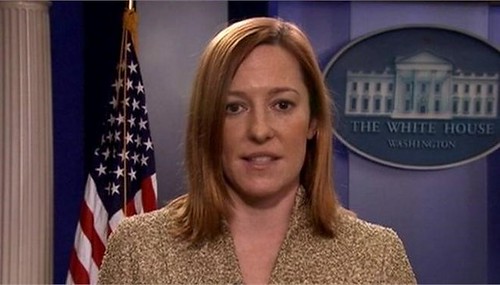The U.S. Government is concerned about the rising political tension in Thailand and is following the ongoing demonstrations in Bangkok closely. We urge all sides to refrain from violence, exercise restraint, and respect the rule of law. Violence and the seizure of public or private property are not acceptable means of resolving political differences. We call upon all sides to uphold international norms that guarantee freedom of the press and the safety of journalists. The United States firmly believes all parties should work together to resolve differences through peaceful dialogue in ways that strengthen democracy and rule of law. As long-time friends of Thailand, we strongly support the Thai nation and its people during this period.

Jen Psaki, spokesperson for the United States Department of State and a former spokesperson for U.S. President Barack Obama
The above statement belongs to Jen Psaki, US State of Department Spokesperson, delivered on 25 November 2013 amid the escalating political conflict in Thailand. The role of the United States in Thai politics has long been active; it can be traced back at least to the Cold War period when the Americans worked closely with the Thai army and the monarchy in setting up a series of pro-US, anti-communist regimes which were essentially undemocratic.
This article looks into the US perception toward Thailand’s political divide. For the United States, traditionally, the benefits of preserving the pro-establishment forces position have been manifest. It permitted the bilateral relationship to become more predictable and less disruptive because of the elites’ continued domination of political power and foreign policy making process. Governments may come and go, but the traditional elites denoted a permanent feature of Thai politics.
During the past few decades, the Thai elites have actively and fiercely protected the status quo and resisted the change of political consensus. For Washington to modify its long-held stance would be perceived as an unnecessary move and could shake the core of its relations with Bangkok. Besides, it could jeopardise the US’s interests in the region. For example, a close alliance with the old powers would assist in maintaining the level of American influence over Thailand and Southeast Asia at a time when the rise of China and its growing power in the region is increasingly threatening to the United States.
Meanwhile, the United States has never been fond of former Prime Minister Thaksin Shinawatra. A sense of frustration over Thaksin’s lack of good governance, ranging from his hard-nosed measures against Thai Muslims in the south, to the widespread extra-judicial killings of drug suspects in 2003, has seemed evident in Washington. Yet, ironically, the United States has never applied the same moral criterion against countless attempts of the Thai traditional elites to obliterate the people’s confidence in the electoral process.
The US’s disinclination to shift its pro-establishment perception raises the crucial question of whether Washington simply aimed at pursuing its interests or indeed failed to fully comprehend Thailand’s political development that has taken place in the past decade. In interviews with a group of Thai and American diplomats, it was clear that since the end of the Cold War which witnessed the decreasing American influence in this region, the US government has not adequately invested in training experts in Southeast Asia, including Thailand.
As its role in Southeast Asia diminished, a series of US governments have taken their ties with countries in the region for granted. The lack of experts has led to the US’s misjudgement of the evolving political process in Thailand. The United States has tended to rely on its old connection with the Thai traditional elites while shoring up their argument of the red-shirted movement as antithetical to Thai democracy and even a menace to the monarchical institution—an argument that aligns with the US’s pro-monarchy position. A former American diplomat revealed that the United States was “freaking out” about the fact that there was a gap in its understanding of the Thai situation. The vacuum of information compelled the US government to interpret its relations with Thailand based on its constricted perception of maintaining the political status quo even as new players in the Thai political landscape were emerging.
A Thai diplomat who served at the Thai Embassy in Washington during 2006-2007 explicated the origin of a possible American misperception. In its East Asian and Pacific Affairs Bureau at the State Department, there was only one junior diplomat at the time, possibly with the rank of a second secretary, in charge of all-encompassing issues on Thailand. She worked under the supervision of a director who was also not an expert on Thailand. “Thailand” was underrepresented in the State Department despite the fact that it remained the US’s principal strategic ally and was awarded major non-NATO ally status in 2003. The attention was for the most part paid to other more powerful countries in Asia, such as China and Japan, as well as to the Muslim world. It was also revealed that there was nobody in the East Asian and Pacific Affairs Bureau who was able to speak Thai, comparing with the Ministry of Foreign Affairs of China in which all of its Thai desk officers spoke Thai fluently.
The State Department seemed not to consider as important the background knowledge of a desk officer. Obviously, the Thai desk officer had no prior knowledge about Thailand and its ongoing political development. Today, this situation has not changed. In interviews with two Singapore-based American diplomats, they explained a rather more detailed structure of the East Asian and Pacific Bureau. At the so-called Thai desk, there is still one full-time mid-level official covering Thailand. In addition, there is a deputy director and director supervising the Thai desk officer, plus the deputy assistant secretary and assistant secretary who have Thailand in their portfolios. But all this does not include other officers who work directly on Thailand, such as in public affairs, economic and consular bureaus, population, refugees and migration offices, Defence, and Commerce and Agriculture Departments.
One of the American diplomats defended his government’s position when asked if there was a lack of Thai expertise resulting in policy ignorance in regards to Thailand. The diplomat said that on many occasions, the real decision-makers in Washington do not rely on information provided by the Thai desk officer or sources from the US Embassy in Bangkok since they do not represent the sole sources of information on the political situation in Thailand. More importantly, the diplomat asked, “If the red-shirts formed the next government, would they change the country’s policy toward Washington?” Such a question seemed to imply that the United States would gain little if it lent its support to the red-shirted movement.
Back in Bangkok, there has been no indication that the US Embassy officials have actually established channels of communication with the red-shirted movement and that they have visited the red-shirts’ power bases—the north and northeast regions which are still Thaksin’s strongholds, in order to conduct thorough interviews or research on the political ideology of these so-called Thaksin’s supporters. The inability to access the red-shirted movement and to monitor the situation closely on the ground could perhaps play an important role behind the US’s fixed mindset about the political situation in Thailand. So far, the US government has seemed to follow in the footstep of ASEAN, in strictly upholding the principle of non-interference in Thai domestic politics—an excuse for Washington and its mission in Bangkok for not making any contact with the red-shirts.
Looking at the above statement again, one could only notice a dull, almost meaningless, message from the United States. Perhaps, the Americans are in the mode of wait and see, as now Thailand is approaching the royal transition period. But sooner or later, the United States will need to reconsider its position in Thailand, particularly since the Thai political landscape has changed so much.

Pavin Chachavalpongpun is associate professor at Kyoto University’s Centre for Southeast Asian Studies.

Since 2007, Prachatai English has been covering underreported issues in Thailand, especially about democratization and human rights, despite the risk and pressure from the law and the authorities. However, with only 2 full-time reporters and increasing annual operating costs, keeping our work going is a challenge. Your support will ensure we stay a professional media source and be able to expand our team to meet the challenges and deliver timely and in-depth reporting.
• Simple steps to support Prachatai English
1. Bank transfer to account “โครงการหนังสือพิมพ์อินเทอร์เน็ต ประชาไท” or “Prachatai Online Newspaper” 091-0-21689-4, Krungthai Bank
2. Or, Transfer money via Paypal, to e-mail address: [email protected], please leave a comment on the transaction as “For Prachatai English”
